PRINCETON, NJ -- Blacks focus more than either whites or Hispanics on unemployment as the nation's top problem. However, whites worry more than blacks or Hispanics about the federal budget deficit, and Hispanics give more weight than the others to immigration.
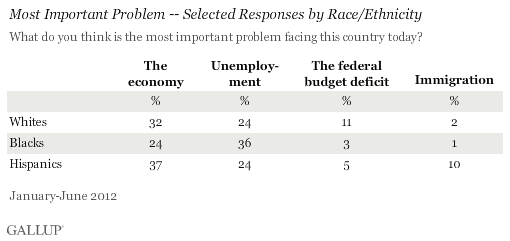
These racial/ethnic differences in perceptions of unemployment may be a direct reflection of real-world differences in unemployment among the groups, with 7.4% of whites unemployed in May, according to the Bureau of Labor Statistics, compared with 11% of Hispanics and 13.6% of blacks.
Gallup uncovered these notable differences in views by subgroup in a review of the issues Americans have named as the "most important problem" facing the country. The findings are from six nationwide Gallup polls conducted from January through June, encompassing interviews with more than 6,000 national adults. Across this period, Americans' responses to the Most Important Problem question have been fairly steady on a monthly basis -- with the economy and jobs consistently leading the list.
In the broadest sense, Americans of all major gender, age, racial/ethnic, income, and even political groups largely agree that economy-related issues are most important, with either "the economy" or jobs coming out on top among all of these groups. Most groups also have poor government in third or fourth place as a concern. However, beyond that, the rank order of issues varies across groups, particularly given the differing emphases they put on the federal budget deficit, ethical/moral decline, and immigration.
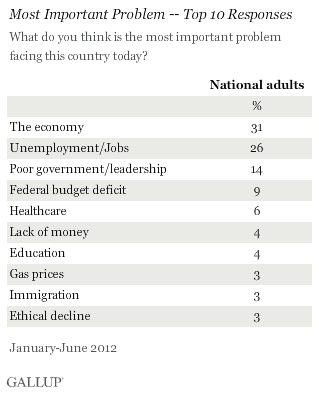
Jobs Named Top Problem by Seniors and Low-Income Americans
Seniors as well as Americans in households earning less than $30,000 annually join blacks in putting the greatest emphasis on unemployment and jobs as the nation's top problem. By contrast, middle- and high-income Americans and those aged 18 through 64 are more likely to name "the economy."
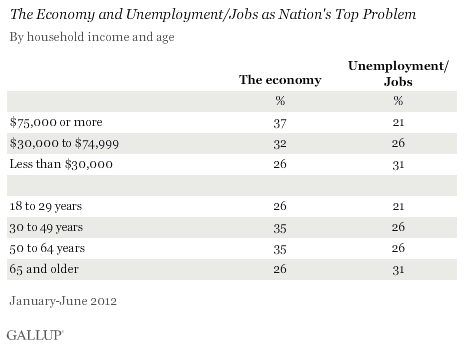
Republican-Oriented Groups Most Likely to Cite the Deficit
About 10% of adults in every major age group mention the federal budget deficit as the top problem, but it is of particular concern to Republicans (16%), adults earning $75,000 or more (12%), whites (11%), and men (11%). Relatively few blacks, Hispanics, low-income Americans, or Democrats mention the issue.
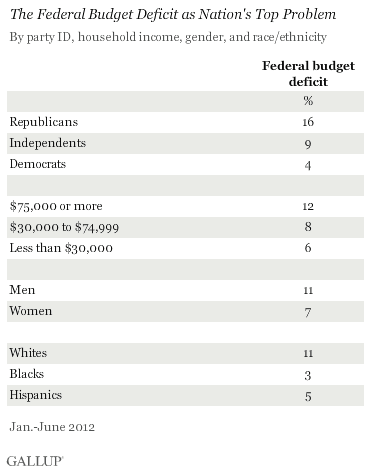
Poor Government Particularly Vexing to Older Adults
Seniors and adults aged 50 to 64 are much more likely to mention issues related to poor government -- including dissatisfaction with the president, Congress, politicians, corruption, and abuse of power -- than are younger adults. Additionally, government is a somewhat greater concern to men than to women, and to whites than to blacks or Hispanics.
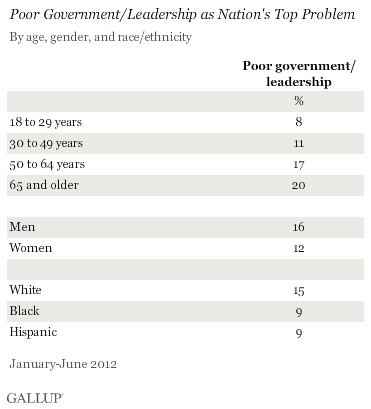
Republicans, independents, and Democrats are in agreement on these issues, with 14% in each group mentioning them.
Education Mentions Skew Young, Ethical Concerns Skew Old
Mentions of education differ a bit by age, with young adults the most likely to name it, at 8%, compared with 2% of those 50 and older. Democrats (6%) are also more likely than Republicans (2%) to cite education.
Mentions of ethical/moral decline in the U.S. also differ slightly by age, with seniors showing the most concern, at 5%, and adults under 50 the least, at 2%. Additionally, 6% of Republicans mention the decline in ethical standards and morals as the nation's most important problem, somewhat more than the 2% for independents and 1% for Democrats.
Mentions of three other issues in the top 10 -- healthcare, "lack of money," and gas prices -- vary little by subgroup.
Bottom Line
Americans are in broad agreement about what most ails the country, with the economy generally or unemployment/jobs specifically ranking either first or second among every major demographic and political subgroup. Still, different groups put different emphases on the two, with middle- and upper-income Americans, young and middle-aged adults, whites, and Hispanics more likely to mention the economy in general, and blacks, low-income adults, and seniors putting more emphasis on jobs.
Among all Americans, immigration ranks at the bottom of the top 10 issues named in the poll, at 3%. However, among Hispanics it ranks third, mentioned by 10%. Additionally, Republicans, whites, men, and wealthier adults express greater concern for the federal budget deficit. Whites, men, and older adults are more likely than their counterparts to cite poor government. Young adults and Democrats express more concern about education, and Republicans express more concern about the nation's ethical/moral decline.
Survey Methods
Results for this analysis are based on six Gallup polls, one each month from January through June 2012. Each poll was conducted by telephone with a random sample of approximately 1,000 adults, aged 18 and older, living in all 50 U.S. states and the District of Columbia.
For results based on the total sample of 6,108 national adults in the aggregated database, one can say with 95% confidence that the maximum margin of sampling error is ±2 percentage points.
Interviews are conducted with respondents on landline telephones and cellular phones, with interviews conducted in Spanish for respondents who are primarily Spanish-speaking. Each sample includes a minimum quota of 400 cell phone respondents and 600 landline respondents per 1,000 national adults, with additional minimum quotas among landline respondents by region. Landline telephone numbers are chosen at random among listed telephone numbers. Cell phone numbers are selected using random-digit-dial methods. Landline respondents are chosen at random within each household on the basis of which member had the most recent birthday.
Samples are weighted by gender, age, race, Hispanic ethnicity, education, region, adults in the household, and phone status (cell phone only/landline only/both, cell phone mostly, and having an unlisted landline number). Demographic weighting targets are based on the March 2011 Current Population Survey figures for the aged 18 and older non-institutionalized population living in U.S. telephone households. All reported margins of sampling error include the computed design effects for weighting and sample design.
In addition to sampling error, question wording and practical difficulties in conducting surveys can introduce error or bias into the findings of public opinion polls.
For more details on Gallup's polling methodology, visit www.gallup.com.
